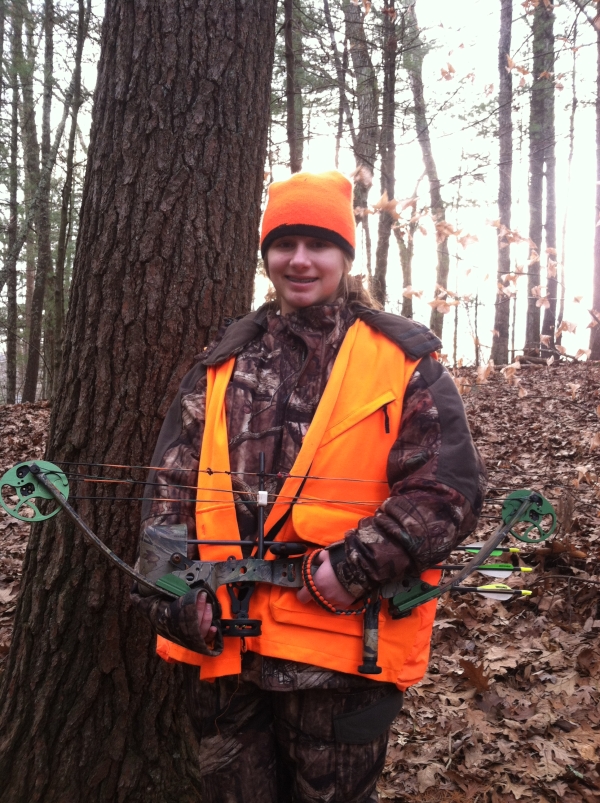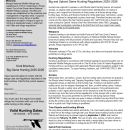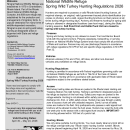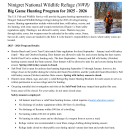
Hunting is an important wildlife management tool that we recognize as a healthy traditional outdoor pastime, deeply rooted in America's heritage. Hunting can instill a unique understanding and appreciation of wildlife, their behavior, and their habitat needs.
Ninigret National Wildlife Refuge encompasses a range of habitats, including pine barrens, shrublands, mature forest and coastal wetlands that host a plethora of resident and migratory wildlife.
National Wildlife Refuge
Big and Upland Game Hunting, Wild Turkey Regulations 2025-2026
The 2025- 26 refuge hunting season will begin September 15, 2025. Hunting regulations, maps and brochure are posted below. All hunters are responsible for reviewing and abiding by these regulations when hunting at Ninigret NWR. Updated regulations and other information are usually posted to this page in late summer.
Hunters are required to possess a valid Rhode Island hunting license, all required stamps, an original valid government-issued photo identification (no copies or photos), and a signed hunt brochure on their person at all times during refuge hunting days.
Archery and firearms hunting for white-tailed deer, wild turkey, coyote, and fox is allowed in designated locations (see map). Permitted hunters may take coyote and fox during the deer hunting season only. Salt Pond Unit is closed to all users during the Special Veteran Deer Hunt (November 15 and 16).
On-going remedial site investigation activities at the Salt Pond Unit may impact hunt quality this year. Keep out of closed areas.
Weapons
Firearms hunting is not allowed on Kettle Pond and Salt Pond Units. Persons possessing, transporting, or carrying firearms on National Wildlife Refuge System lands must comply with all provisions of State and local laws. Persons may only use (discharge) firearms in accordance with refuge regulations (50 CFR 27.42 and specific refuge regulations in 50 CFR 32.58).
Vehicles
All-terrain vehicles (ATVs and UTVs), dirt bikes, and other non-licensed vehicles are prohibited on refuge lands.
Hunting Regulations
Hunting is permitted in accordance with Federal regulations governing public use on National Wildlife Refuges as set forth in Title 50 of the Code of Federal Regulations. Hunting will be in accordance with applicable Rhode Island regulations subject to the conditions stated below. To report hunting violations, call 1-844-FWS-TIPS (1-844-397-8477).
Access
White-tailed deer, wild turkey, coyote, and fox hunting dates and times are posted in the Rhode Island Hunting and Trapping Abstract. Hunting is permitted in designated areas as depicted on the hunting map. Hunting is not allowed within safety zones, and no weapon discharge into, from, or within safety zones. Hunters may pass through a safety zone with unloaded weapons. Only participants who possess a valid, signed hunt brochure will be allowed to enter the hunt areas. Hunters may scout the hunt units two weeks prior to the season with a valid, signed hunt brochure. No access permitted to Salt Pond Unit during Special Hunts.
IMPORTANT: Public use trails are open to hikers at Kettle Pond and Salt Pond Units during the archery deer and archery turkey seasons. No hunting allowed within 100 feet of a public trail. Night hunting is prohibited.
Firearms
Persons possessing, transporting, or carrying firearms on National Wildlife Refuge System lands must comply with all provision of State and Federal laws. Persons may only use (discharge (discharge) firearms in accordance with refuge regulations (50 CFR 27.42 and specific refuge regulations in 50 CFR Pat 32).
Tree Stands and Hunting Blinds
We only allow portable tree stands and blinds. You must clearly label any tree stand or blind left on the refuge overnight with your Rhode Island hunting license number. Stands and blinds may be placed beginning September 1, 2025, and must be removed by February 15, 2026. The use of nails, wire, screws, or bolts to attach a stand to a tree or hunting from a tree into which a metal object has been driven to support a hunter is prohibited on refuge lands (50 CFR 32.2(i)).
Game/Trail Cameras
All game/trail cameras must be clearly labeled on the exterior of the housing with the hunter’s State hunting license number. When deploying cameras, mounting hardware must not cause damage to vegetation. Cameras may be placed beginning September 1, 2025 and must be removed by February 15, 2026.
Harvest Reporting
Hunters must follow State harvest reporting requirements.
REMEMBER! Your signed refuge hunt brochure authorizes you to take specific game only. Harming or needlessly disturbing any other wildlife is a violation of Refuge regulations and is cause for prosecution.
Clarification on HUNTING SAFETY ZONES
On National Wildlife Refuge lands, no hunting is allowed within the hunt safety zones (see map below). Hunters may not discharge weapons into, from, or within a hunt safety zone. Safety zones for archery hunting include areas within 200 feet of a dwelling. For firearms, all areas within 500 feet of a dwelling.
Hunters may pass through safety zones on their way to hunt units, but weapons must be unloaded (including archery equipment) within safety zones. Some, but not all safety zones are marked in the field. It is the hunters responsibility to know where safety zones are located.
Special Veteran Deer Hunt
We partner with Freedom Hunters to host a limited deer hunting opportunity for veterans with disabilities at the Salt Pond Unit in November (11/15-11/16, 2025). The unit will be closed to all users during the special hunt. Please contact the refuge for more information about this program 401-364-9124.
Youth Deer Hunt
Thank you for participating in the 2024 Youth Deer Hunt.




